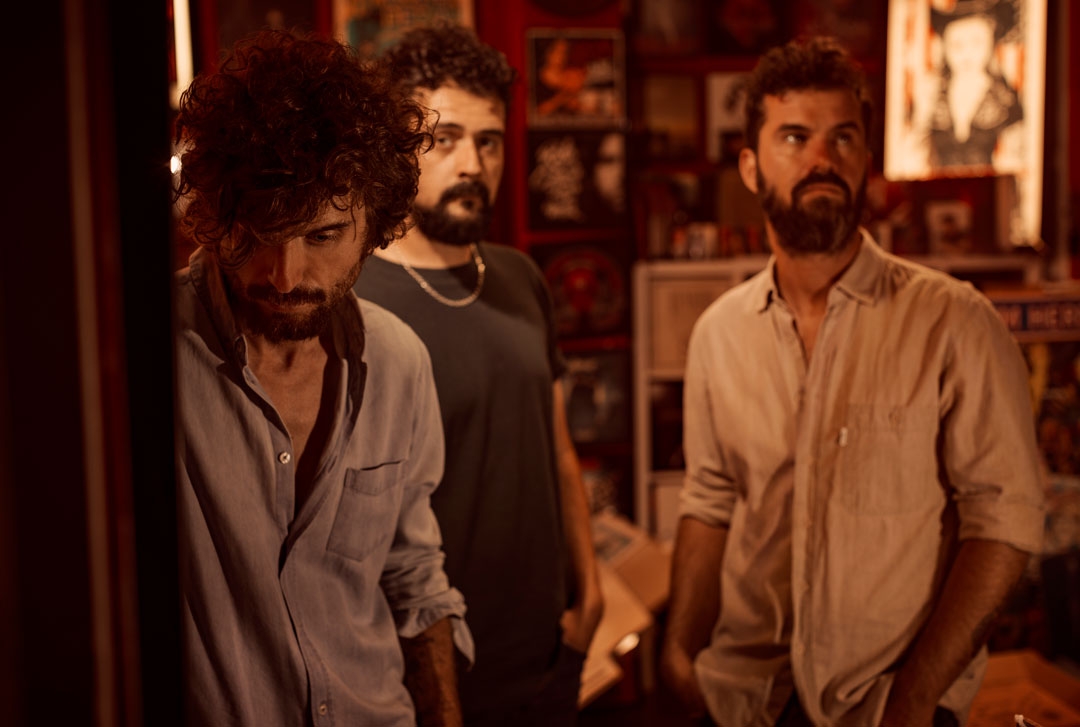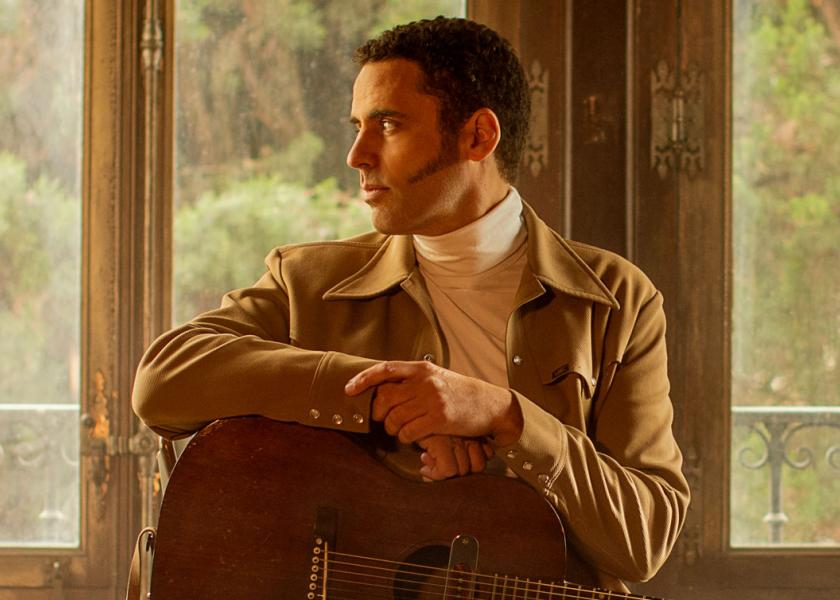Tu Otra Bonita
Beyond labels

Tu Otra Bonita is a band that has had to ‘sweat’ for each listener, as they themselves admit. They’ve never had the media coverage of other bands, perhaps because, in a country accustomed to putting everything in boxes, they’ve remained on the sidelines, beyond labels. After the success of ‘Crema’, they’re adding the finishing touches to their next album while preparing for a mini-tour across music halls in November.
The first thing Héctor Lacosta and Félix Vigara do is apologise for their bandmate Alberto Valecillo not being here for this interview. A humble and friendly attitude that is probably one of the keys to the success of Tu Otra Bonita. Because we’re talking about a band that hasn’t been handed anything on a silver platter, each and every one of the once-in-a-lifetime moments they’ve experienced has come after lots of hard work. After playing at MadBlue Festival —an event sponsored by Iberia that was part of the National Day of Spain celebrations— they will play a mini-tour, which has practically sold out, to celebrate the tenth anniversary of their first album. There, they will be reunited with their long-standing and newer fans, who are willing to be amazed by a band that has always remained indescribable.
Your music is usually described as “chameleon-like”, “versatile”, “unclassifiable”... Has that creative freedom turned into your hallmark, in a way?
Héctor: Yes, not fitting in a box has allowed us to be free and people have understood that we can do what we like. Since the beginning, we chose not to fit a particular mould, but we also have to admit that it came naturally, it wasn’t deliberate. Even within the same song we can jump between different styles and we’re happy with that. It’s musically enriching.
Félix: We like all kinds of music. Each member of the band has his own taste and that’s reflected in our songs, we don’t fit inside a particular box, and we take elements from different styles.
Often fans don’t take style changes by their favourite bands particularly well. Are yours the exception?
Héctor: In a way, this is what we’ve taught them. A fan may approach us to tell us they like this or that album best, but we haven’t lost any followers because our style has changed. We’ve always sought out a particular sound, which I think we’ve found; when you play one of our songs, you know it’s by Tu Otra Bonita.
“The world of music is incredibly tough, people think it just means going on-stage, playing for an hour and a half and going home, but that’s not the case” — Héctor Lacosta
You’re just putting the finishing touches on your next album, which comes after the success of Crema. Are you nervous?
Héctor: Many ask us if this album will be better than Crema and I think it’s going to be different. Crema is a great album and we’re really proud of it, it allowed us to take one step further in our career. But we’re not nervous because we received the final songs recently and, at the risk of sounding cocky, it’s another banger. In fact, we joke that it’s going to win a Grammy... Or two! (laughs). We’re really happy because we’ve worked with great professionals, like Emilio Mercader, who’s our producer.
Félix: The album sounds amazing and there’s great production work behind it, which we might not have had on previous albums. With this I don’t mean that it’s better or worse, just that we’re really happy with how it’s turning out.
In November, you’ll play a mini-tour to celebrate the tenth anniversary of your first album: Solitario hombre escoba. Which is the main lesson you’ve learnt since then?
Héctor: One of the main takeaways is that you have to sweat for each listener. We’ve always believed, and perhaps that was a mistake, that having good songs was enough. But that’s not the case. There are many things that help improve your position in this business. The world of music is incredibly tough, people think it just means going on-stage, playing for an hour and a half, and going home, but that’s not the case. There are many hours of songwriting, recording, rehearsals, meetings, travelling... And we also need to value creativity. The band isn’t a job to us, and we don’t always get paid, but we want the project to succeed, and we give it our all.
The tickets for these concerts sold out in minutes, even causing the sales platform to crash. Did you imagine anything like this a decade ago?
Félix: No way! We were talking about this recently, we’re so proud of how far we’ve come. Who would’ve thought that we’d be at so many festivals, that we’d collaborate with artists we admire or sell out a show in Madrid in ten minutes? It’s really rewarding. We wanted to play at the music halls we started out in and it’s going to be really special, both for us and for people who’ve been listening to us for years.

‘Y si no soy yo’ and ‘M’enamorao’ are the first singles on Tu Otra Bonita’s upcoming album. © Juan Pérez Fajardo
If you could only choose one stand-out moment of the decade, which would it be?
Héctor: There are many, but one that left a big mark was going on-stage with Juanito Makandé to play Alitas de mar. We wrote the song together and he invited us to sing it with him at one of his concerts in La Riviera before the pandemic. His fans threw themselves into the song and it was amazing. Then we played with him again in Seville in front of 15,000 people and it was incredible, but it wasn’t like that first time.
Félix: It was a stand-out moment and the three of us have the same memory of it. Juanito told us that, during concerts, many people requested that song and it was incredible to share that moment with him.
You recently took part in MadBlue Festival, an event that aligns with sustainable development. Do you think that the fight against climate change is inevitable?
Héctor: Yes, if anyone thinks otherwise, they’re living on another planet. We’re ruining it. But it shouldn’t even be a fight because it’s something we should’ve already internalised. If our concert made a small contribution, we’re happy. When we were given the chance to take part, we were really excited, especially because we’d be playing alongside colleagues we admire.
You’ve collaborated with many artists. Have those connections helped you to grow?
Héctor: Of course. Collaborations have helped put us on the map. Also, whenever we’ve suggested recording a song with an artist, we’ve always gotten on really well with them. We don’t have the media coverage other bands have, and collaborations allow us to reach a wider audience. Our songs speak for us and, how can we amplify them? By getting together with other musicians who like what we do and vice versa.
Félix: It’s really important for collaborations to come about naturally, for you to know the artist and that they fancy working with you. It’s a really rewarding experience because it brings something new to your music. That first collaboration we did, on Alitas de mar with Juanito Makandé, was like a lucky charm for us. One of those musical moments that is a gift that you get to keep forever.
“I believe you need to be talented to reach certain goals, but obviously hard work is a must” — Félix Vigara
On this long road towards success, which has played a bigger role: talent or hard work?
Félix: It’s a mix of both because, in the end, no matter how hard you work you need to have a distinguishing factor, and that factor is talent. Tu Otra Bonita is very talented. What can I say about Héctor, who writes all our lyrics and is pure talent, as I always say. But Alberto and I are also in charge of the melody. I believe you need to be talented to reach certain goals, but obviously hard work is a must.
And if you had to define talent, what would it be?
Héctor: It’s tough. Firstly, because talent can be subjective. Someone can think that I’m talented and the next person can believe the opposite.
Félix: I believe talent is something innate that makes you stand out, like meeting certain requirements.
Héctor: But who has the yardstick of talent? Who decides who is and isn’t talented? Perhaps Félix is really talented at skiing, but since he’s never tried it, he doesn’t know (laughs). I’m considering taking up fencing, and maybe I’m a pro at it (laughs).
Félix: Of course, we probably have hidden talents. And some people may never discover theirs. When we’re born, we should know what we’re good at.
Héctor: That’d be great, but I think the beauty of life is discovering what you’re talented at. And discovering it and learning what you need to do to make it grow is a beautiful process.


